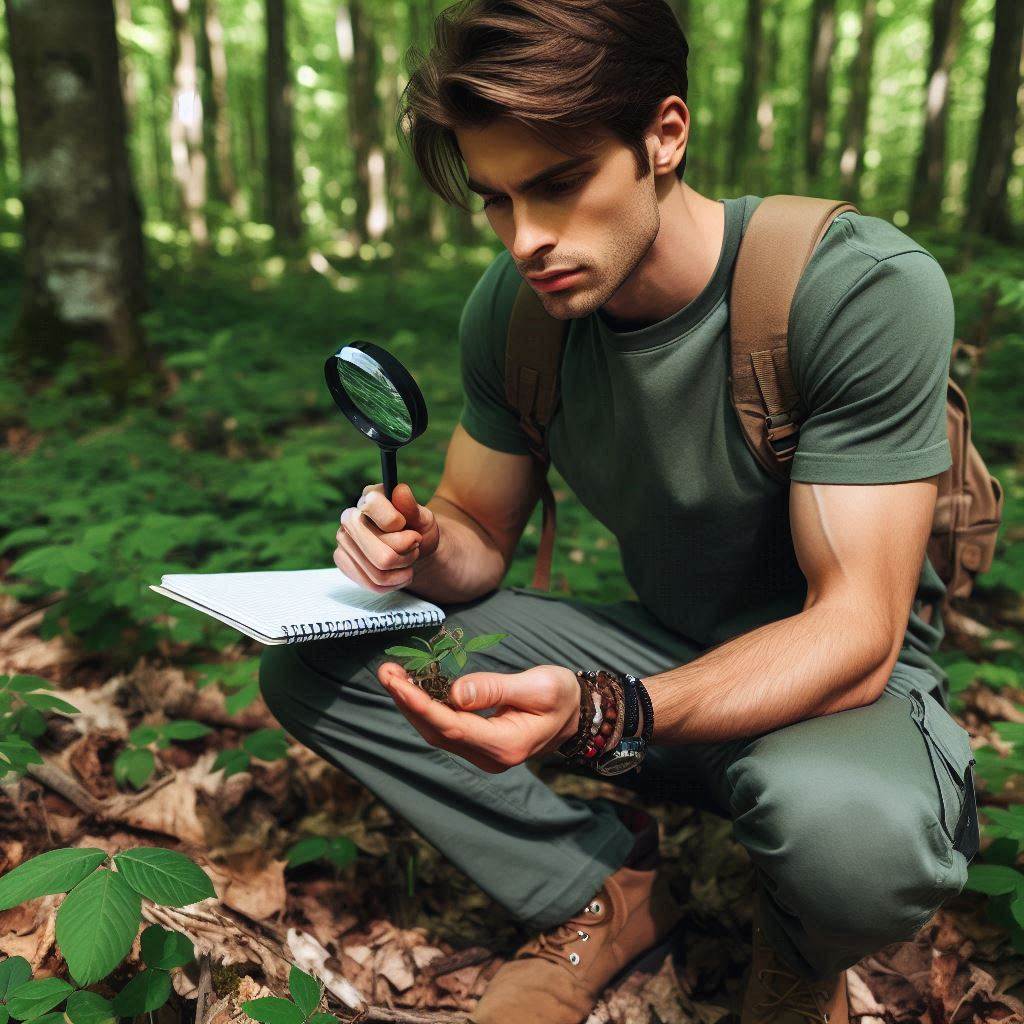Introduction
Ecologists and environmental scientists play vital roles in studying and protecting our planet.
Their work helps us understand complex environmental issues.
While both fields aim to address ecological concerns, they approach problems differently.
Ecologists focus on the relationships between organisms and their environments.
They study ecosystems, biodiversity, and natural processes.
Their work emphasizes understanding ecological balance and preserving species.
In contrast, environmental scientists analyze the impact of human activities on the environment.
They consider various factors, including pollution, resource management, and sustainability.
Their research informs policies and strategies for mitigating environmental degradation.
Understanding the differences between these two fields is essential for several reasons.
It helps individuals identify career paths and educational opportunities.
Knowing the distinctions also allows for better collaboration between professionals in both areas.
As environmental challenges grow, the need for both ecologists and environmental scientists becomes increasingly important.
Their combined efforts are essential for fostering a sustainable future.
Recognizing their unique roles can lead to more effective solutions for our planet’s pressing issues.
Educational Background
Ecologists Focus on Biology, Ecology, and Environmental Science
Understanding the differences between ecologists and environmental scientists begins with their educational backgrounds.
Ecologists typically focus on biology, ecology, and environmental science.
They study living organisms, their interactions, and their environments.
This specialized training equips them with a deep understanding of ecosystems, species interactions, and environmental processes.
Ecologists often pursue degrees in biology or ecology.
Their coursework includes subjects like plant and animal physiology, population dynamics, and ecosystem management.
Many ecologists also participate in field studies to gain practical experience.
This hands-on approach enhances their understanding of ecological principles and conservation strategies.
Environmental Scientists Have a Broader Range of Disciplines Including Chemistry, Physics, and Geology
On the other hand, environmental scientists have a broader range of disciplines in their education.
Their studies encompass chemistry, physics, geology, and environmental policy.
This multidisciplinary approach allows them to analyze environmental issues from multiple perspectives.
Environmental scientists often focus on how human activities impact the environment.
They examine pollution, resource management, and the effects of climate change.
Environmental scientists typically earn degrees in environmental science or related fields.
Their coursework often includes chemistry, biology, environmental law, and statistics.
Many environmental scientists engage in laboratory work, conducting experiments to assess environmental conditions.
This focus on experimentation and analysis helps them understand complex environmental systems.
Both ecologists and environmental scientists contribute valuable insights to environmental issues.
However, their educational paths shape their perspectives and methodologies.
Ecologists often concentrate on biological systems, while environmental scientists address a wider array of environmental challenges.
Ecologists might study the effects of invasive species on native populations.
They focus on how these species alter ecosystem dynamics.
Their research often informs conservation efforts aimed at preserving biodiversity.
Environmental scientists, however, might analyze the chemical composition of pollutants in water sources.
They evaluate the potential health impacts of these pollutants on ecosystems and human populations.
Their work plays a crucial role in shaping environmental regulations and policies.
While both fields are interconnected, their distinct educational backgrounds lead to different approaches.
Ecologists often conduct field studies to gather data on species interactions and habitat conditions.
Environmental scientists may rely more on laboratory analysis and modeling to assess environmental problems.
The educational backgrounds of ecologists and environmental scientists significantly influence their work.
Ecologists focus on biological aspects of ecosystems, while environmental scientists draw from various disciplines.
Both roles are essential in addressing environmental challenges.
By understanding these differences, we can appreciate the diverse approaches to studying and protecting our environment.
Scope of Study
Ecologists Study Interactions Between Organisms and Their Environment
The scope of study for ecologists revolves around the interactions between organisms and their environments.
Ecologists investigate how species interact with one another and their habitats.
They analyze these relationships to understand ecosystem dynamics and health.
This focus on interactions helps them identify ecological patterns and processes.
Ecologists study various components of ecosystems.
They examine plants, animals, microorganisms, and their physical surroundings.
Their research often includes exploring food webs, nutrient cycles, and habitat structures.
By understanding these elements, ecologists can assess the overall health of ecosystems.
Field studies are crucial for ecologists.
They collect data through observations, experiments, and sampling.
These methods provide insights into species behavior, population dynamics, and community interactions.
Ecologists also use statistical models to analyze their findings, contributing to conservation strategies.
Moreover, ecologists may work on specific issues like habitat restoration and species conservation.
They evaluate the impact of invasive species on native populations.
Their findings inform management practices that aim to protect biodiversity.
Environmental Scientists Focus on the Impact of Human Activities on Natural Resources and Ecosystems
In contrast, environmental scientists focus on the impact of human activities on natural resources and ecosystems.
They investigate how industrialization, urbanization, and agriculture affect the environment.
This research helps identify sustainable practices to mitigate negative impacts.
Environmental scientists analyze pollutants and their effects on ecosystems.
They study air and water quality, soil contamination, and waste management.
Their work often involves assessing the risks associated with human activities.
They aim to develop strategies for pollution control and environmental protection.
Additionally, environmental scientists evaluate the effects of climate change on natural resources.
They study how rising temperatures and altered precipitation patterns impact ecosystems.
This research is critical for developing adaptation and mitigation strategies.
Environmental scientists often collaborate with policymakers and organizations.
They provide scientific data to inform environmental regulations and management plans.
Their expertise is essential in creating sustainable policies that balance human needs with ecological health.
Both ecologists and environmental scientists contribute valuable knowledge to environmental issues.
However, their focuses differ significantly.
Ecologists prioritize understanding natural interactions within ecosystems.
In contrast, environmental scientists emphasize human impacts on these systems.
Ecologists may conduct studies on how climate change affects species distribution.
They analyze the resilience of ecosystems to environmental stressors.
Their research informs conservation efforts aimed at preserving biodiversity.
Environmental scientists, however, may evaluate the effectiveness of clean energy solutions.
They assess how renewable energy sources impact ecosystems compared to fossil fuels.
This research is crucial for promoting sustainable energy practices.
The scope of study for ecologists and environmental scientists highlights their unique focuses.
Ecologists explore interactions within ecosystems, while environmental scientists investigate human impacts on the environment.
Both fields provide essential insights that guide conservation and sustainability efforts.
Read: Key Roles and Responsibilities of a Chemist in the US
Research Methods
Ecologists Conduct Fieldwork, Experiments, and Data Analysis to Understand Ecosystems
Ecologists employ various research methods to study ecosystems effectively.
They prioritize fieldwork, which involves observing organisms in their natural habitats.
This hands-on approach allows ecologists to gather real-time data about species interactions and environmental conditions.
Experiments are another crucial method ecologists use.
They set up controlled experiments to test hypotheses about ecological processes.
By manipulating variables, ecologists can determine cause-and-effect relationships in ecosystems.
These experiments often involve studying how species respond to changes in their environment, such as habitat alterations or climate variations.
Data analysis plays a vital role in ecological research.
Ecologists collect data from field observations and experiments, which they then analyze statistically.
This analysis helps them identify patterns and trends within ecosystems.
For example, they might use statistical models to understand how population dynamics change over time.
These findings contribute to our knowledge of ecological balance and health.
Additionally, ecologists often collaborate with other scientists and organizations.
They share data and findings to enhance the understanding of ecosystems on a broader scale.
This collaboration leads to more comprehensive research outcomes that inform conservation efforts and environmental policies.
Environmental Scientists Utilize Risk Assessment, Modeling, and Policy Analysis to Address Environmental Issues
In contrast, environmental scientists use different research methods to tackle environmental issues.
Risk assessment is a primary method they employ to evaluate potential hazards.
They analyze the likelihood and consequences of environmental risks, such as chemical spills or habitat destruction.
This assessment helps prioritize actions needed to mitigate harm to ecosystems and public health.
Modeling is another critical technique for environmental scientists.
They create mathematical and computational models to simulate environmental processes.
These models help predict how ecosystems respond to various human activities and natural changes.
For example, they might model how urbanization affects local wildlife populations.
Such models provide valuable insights for policymakers and planners.
Policy analysis is also essential in the work of environmental scientists.
They assess existing environmental policies and regulations to determine their effectiveness.
By evaluating the outcomes of these policies, they identify areas for improvement.
This analysis helps shape future policies that promote environmental sustainability and protection.
Environmental scientists frequently collaborate with government agencies, NGOs, and communities.
They use their research to advocate for evidence-based policies that address pressing environmental challenges.
Both ecologists and environmental scientists contribute significantly to our understanding of the environment.
This distinction highlights the complementary nature of both fields in addressing environmental challenges.
The research methods employed by ecologists and environmental scientists illustrate their unique approaches to studying the environment.
Understanding these methods enriches our appreciation for the diverse strategies used to tackle ecological and environmental issues.
Both fields play vital roles in advancing environmental science and informing effective conservation practices.
Read: Earning Potential: Chemist Salaries Across US States
Career Opportunities
Ecologists Work in Research Institutions, Conservation Organizations, and Government Agencies
Ecologists have diverse career opportunities across various sectors.
They often work in research institutions, where they focus on studying ecosystems and biodiversity.
These institutions include universities, government labs, and non-profit research organizations.
Here, ecologists conduct studies that advance scientific knowledge and inform conservation efforts.
Many ecologists find fulfilling roles in conservation organizations.
These groups aim to protect natural habitats and restore damaged ecosystems.
Ecologists in these settings develop and implement conservation strategies based on their research.
They work directly in the field, conducting assessments and monitoring species populations.
Government agencies also employ ecologists to address environmental issues.
They may work for local, state, or federal agencies focused on environmental protection.
In these roles, ecologists help develop policies and regulations aimed at conserving natural resources.
They also provide expertise on ecological assessments and environmental impact statements.
Ecologists often collaborate with various stakeholders.
These can include landowners, community groups, and policymakers.
By engaging with these stakeholders, ecologists promote sustainable practices and educate the public about ecological issues.
This outreach ensures that their research translates into real-world applications.
Environmental Scientists Find Employment in Consulting Firms, Regulatory Agencies, and Non-Profit Organizations
Environmental scientists pursue a wide range of career opportunities as well.
Many work for consulting firms that specialize in environmental assessments and compliance.
In these roles, they conduct environmental impact assessments for businesses and projects.
They analyze data and provide recommendations to ensure compliance with environmental regulations.
Regulatory agencies also employ environmental scientists to monitor environmental quality.
They assess pollution levels and enforce environmental laws.
These scientists play a crucial role in protecting public health and ensuring sustainable resource use.
They develop guidelines and standards that industries must follow to minimize their environmental impact.
Non-profit organizations provide additional career opportunities for environmental scientists.
These organizations focus on advocacy, research, and community engagement.
Environmental scientists in these roles often work on campaigns to promote sustainability and environmental justice.
They engage with communities to raise awareness about environmental issues and drive positive change.
Both ecologists and environmental scientists can also pursue academic careers.
Many choose to teach and mentor the next generation of environmental professionals.
In academic settings, they contribute to research and publications, advancing knowledge in their fields.
Job prospects in both fields continue to grow as awareness of environmental issues increases.
Organizations increasingly seek professionals who can address climate change, pollution, and biodiversity loss.
This trend creates numerous opportunities for both ecologists and environmental scientists.
Both ecologists and environmental scientists have diverse career opportunities across various sectors.
Ecologists focus on research, conservation, and government roles, while environmental scientists work in consulting, regulation, and non-profit sectors.
Understanding these career paths can guide aspiring professionals in choosing their futures.
Each role plays a vital part in addressing pressing environmental challenges.
Read: Top Chemistry Departments and Schools in the US

Goals and Objectives
Ecologists Strive to Understand and Preserve Biodiversity
Ecologists primarily focus on understanding ecosystems and the intricate relationships within them.
Their primary goal is to preserve biodiversity, which is essential for a healthy planet.
They conduct research to identify species, study their behaviors, and assess their habitats.
This knowledge helps them understand how species interact within ecosystems.
Ecologists aim to discover how changes in the environment impact biodiversity.
They study the effects of climate change, habitat loss, and pollution on various species.
By understanding these impacts, ecologists can propose conservation strategies to protect endangered species.
Their research often leads to practical solutions for habitat restoration and species recovery.
In addition to conducting field studies, ecologists engage in community outreach.
They educate the public about the importance of biodiversity and its role in ecosystem health.
By raising awareness, they promote conservation efforts that can involve local communities.
Ecologists work with stakeholders to develop initiatives that preserve natural resources and habitats.
Collaboration is vital for ecologists in achieving their goals.
They often partner with government agencies, non-profit organizations, and other researchers.
These collaborations enhance the effectiveness of conservation projects and increase funding opportunities.
Together, they can implement large-scale conservation strategies that address complex ecological challenges.
Environmental Scientists Aim to Address Environmental Challenges and Promote Sustainability
Environmental scientists focus on identifying and addressing environmental challenges.
Their primary objective is to promote sustainability through effective resource management.
They assess human activities’ impacts on the environment, aiming to mitigate negative effects.
This work often involves studying pollution, climate change, and habitat degradation.
Environmental scientists conduct research to inform policy decisions.
They analyze data and use modeling techniques to predict environmental outcomes.
This research helps governments and organizations develop sustainable practices and regulations.
Their efforts lead to improved management of natural resources and reduced environmental harm.
Sustainability is a core value for environmental scientists.
They advocate for practices that minimize waste and promote resource conservation.
By studying renewable energy, waste management, and sustainable agriculture, they help create a greener future.
Their research contributes to the development of technologies that reduce environmental footprints.
Community engagement is also crucial for environmental scientists.
They work with businesses and local governments to implement sustainable practices.
These partnerships help educate the public and promote environmental stewardship.
By involving communities, they create a collective effort towards sustainability.
Both ecologists and environmental scientists share a commitment to protecting the planet.
They recognize that biodiversity and sustainability are interconnected.
Understanding ecosystems’ health ensures a sustainable future for all species, including humans.
By pursuing their respective goals, both professionals contribute to a healthier environment.
Ecologists aim to understand and preserve biodiversity, while environmental scientists address environmental challenges and promote sustainability.
Both roles are essential in tackling pressing global issues.
Their combined efforts will ensure a balanced and sustainable planet for future generations.
Read: How to Become a Licensed Chemist in the USA: Steps and Tips
See Related Content: How Climatologists Influence Environmental Policies
Collaboration and Interdisciplinary Approach
Ecologists Often Work in Interdisciplinary Teams to Study Complex Ecological Systems
Ecologists frequently collaborate with professionals from various disciplines.
This collaboration enhances their understanding of complex ecological systems.
They work alongside biologists, geographers, and environmental engineers.
This teamwork fosters a comprehensive approach to ecological research.
By engaging with experts from different fields, ecologists gain diverse perspectives.
They can analyze ecosystems from multiple angles, leading to richer insights.
For example, collaboration with geographers helps ecologists understand the landscape’s influence on species distribution.
Integrating data from different disciplines enhances the accuracy of ecological models.
Ecologists also work with social scientists to incorporate human dimensions.
Understanding human behavior and cultural practices is crucial for effective conservation.
This interdisciplinary approach ensures that ecological strategies are socially acceptable and practically applicable.
By collaborating with social scientists, ecologists can engage local communities in conservation efforts.
Interdisciplinary research projects often tackle pressing environmental challenges.
For instance, studying the impact of climate change on biodiversity requires diverse expertise.
Ecologists must understand both biological responses and the socio-economic factors involved.
Such projects often result in innovative solutions that consider ecological, economic, and social aspects.
Additionally, ecologists participate in collaborative networks and research institutions.
These networks promote knowledge sharing and resource pooling.
Collaborative efforts can lead to large-scale studies that address regional or global ecological issues.
They help ecologists stay informed about the latest research and methodologies.
Environmental Scientists Collaborate with Experts from Various Fields to Address Environmental Issues Holistically
Environmental scientists also emphasize collaboration to address environmental challenges.
They recognize that environmental issues are complex and interconnected.
Thus, they engage experts from multiple fields, including chemistry, engineering, and public policy.
This interdisciplinary approach facilitates a comprehensive understanding of environmental problems.
For instance, addressing pollution requires knowledge of chemistry and engineering.
Environmental scientists collaborate with chemists to analyze pollutants and their sources.
They then work with engineers to design effective waste management systems.
This teamwork ensures that solutions are scientifically sound and technologically feasible.
Moreover, environmental scientists often collaborate with economists and social scientists.
Understanding the economic implications of environmental policies is essential.
By engaging with economists, they can assess the cost-effectiveness of various interventions.
This information helps policymakers make informed decisions that balance environmental protection with economic growth.
Environmental scientists also engage with stakeholders, including government agencies and NGOs.
These collaborations enhance the effectiveness of environmental policies and initiatives.
By involving diverse stakeholders, they ensure that solutions are equitable and inclusive.
Collaborative projects can lead to community-driven initiatives that address local environmental challenges.
Furthermore, interdisciplinary teams enable environmental scientists to develop innovative technologies.
By combining knowledge from different fields, they can create solutions that address multiple environmental issues simultaneously.
This holistic approach enhances the effectiveness of conservation and sustainability efforts.
Both ecologists and environmental scientists prioritize collaboration.
They recognize the importance of interdisciplinary approaches to address complex environmental challenges.
By working together with experts from various fields, they can create effective solutions.
Their combined efforts enhance our understanding of ecosystems and promote sustainability, benefiting both the environment and society.
You Might Also Like: Innovative Biomedical Engineering Projects and Ideas
Policy Influence
Ecologists Provide Scientific Evidence to Inform Environmental Policies and Decision-Making
Ecologists play a vital role in shaping environmental policies.
They collect and analyze data that highlight ecological issues.
This scientific evidence is crucial for informed decision-making.
Policymakers rely on ecologists to understand the impacts of human activities on ecosystems.
Ecologists conduct research that uncovers trends in biodiversity and ecosystem health.
They monitor changes in species populations and habitats.
This research helps identify critical areas needing protection.
By presenting their findings, ecologists advocate for policies that promote conservation.
In addition, ecologists participate in policy discussions and workshops.
They share their expertise with lawmakers and stakeholders.
This collaboration ensures that policies are grounded in scientific understanding.
Ecologists often provide recommendations for sustainable practices and conservation strategies.
Furthermore, ecologists contribute to environmental assessments.
They evaluate the potential impacts of proposed projects on ecosystems.
Their assessments help policymakers weigh environmental risks against economic benefits.
This process encourages the adoption of environmentally responsible practices.
Ecologists also collaborate with non-governmental organizations (NGOs).
Together, they develop initiatives that promote conservation and sustainability.
By working with NGOs, ecologists can amplify their influence on policy.
These collaborations often lead to grassroots movements that advocate for ecological protection.
Transform Your Career Today
Unlock a personalized career strategy that drives real results. Get tailored advice and a roadmap designed just for you.
Start NowEnvironmental Scientists Play a Crucial Role in Shaping Environmental Regulations and Sustainability Initiatives
Environmental scientists also significantly impact environmental policies.
They analyze the effects of human activities on natural resources.
This analysis informs the development of regulations aimed at mitigating negative impacts.
Their research guides policymakers in creating effective sustainability initiatives.
Environmental scientists study various issues, including air and water quality.
They assess how pollution affects public health and ecosystems.
This research informs regulations that protect both people and the environment.
For example, findings on toxic substances can lead to stricter emission standards.
Additionally, environmental scientists engage in risk assessments.
They evaluate the potential consequences of environmental hazards.
This information is crucial for creating regulations that safeguard public health and the environment.
By quantifying risks, environmental scientists help policymakers prioritize issues needing immediate attention.
Moreover, environmental scientists work closely with government agencies.
They provide technical expertise to support regulatory frameworks.
Their involvement ensures that policies are evidence-based and effective.
This collaboration fosters transparency and accountability in environmental governance.
Environmental scientists also advocate for sustainable practices.
They work with industries to develop environmentally friendly technologies.
By promoting sustainable alternatives, they help reduce the ecological footprint of various sectors.
This proactive approach enhances the effectiveness of environmental policies.
Furthermore, environmental scientists engage in public outreach and education.
They raise awareness about pressing environmental issues.
By informing the public, they empower individuals to advocate for sustainable practices.
This grassroots engagement can influence policy changes at local, state, and national levels.
Both ecologists and environmental scientists influence policy.
They provide essential scientific evidence and expertise that shape environmental regulations.
Their collaborative efforts enhance sustainability initiatives and promote effective decision-making.
By working together, they contribute to creating a healthier environment for future generations.
Conclusion
Ecologists and environmental scientists play crucial roles in addressing environmental challenges.
Their educational backgrounds differ, with ecologists focusing on biology and ecology.
In contrast, environmental scientists encompass broader disciplines like chemistry and geology.
Their scopes of study also vary.
Ecologists examine interactions between organisms and their environments.
Environmental scientists analyze human impacts on natural resources and ecosystems.
Research methods further highlight these differences.
Ecologists conduct fieldwork and experiments to understand ecosystems.
Environmental scientists use modeling and policy analysis to tackle environmental issues.
Both fields offer diverse career opportunities.
Ecologists work in conservation organizations and research institutions.
Environmental scientists find roles in regulatory agencies and consulting firms.
Despite their differences, ecologists and environmental scientists complement each other.
Their collaboration enhances our understanding of environmental challenges.
Together, they promote conservation efforts and develop sustainable solutions.
By leveraging their unique strengths, they contribute to a healthier planet.
Their combined efforts are essential for achieving a sustainable future.
Aspiring professionals should appreciate the value of both fields in promoting ecological balance and sustainability.
[E-Books for Sale]
The Big Book of 500 High-Paying Jobs in America: Unlock Your Earning Potential
$19.99 • 500 High-Paying Jobs • 330 pages
Explore 500 high-paying jobs in America and learn how to boost your career, earn more, and achieve success!
See All 500 High-Paying Jobs of this E-Book
1001 Professions Without a Degree: High-Paying American Jobs You Can Start Now
$19.99 • 1001 Professions Without a Degree • 174 pages
Discover 1001 high-paying jobs without a degree! Unlock career tips, skills, and success strategies for just $19.99!




